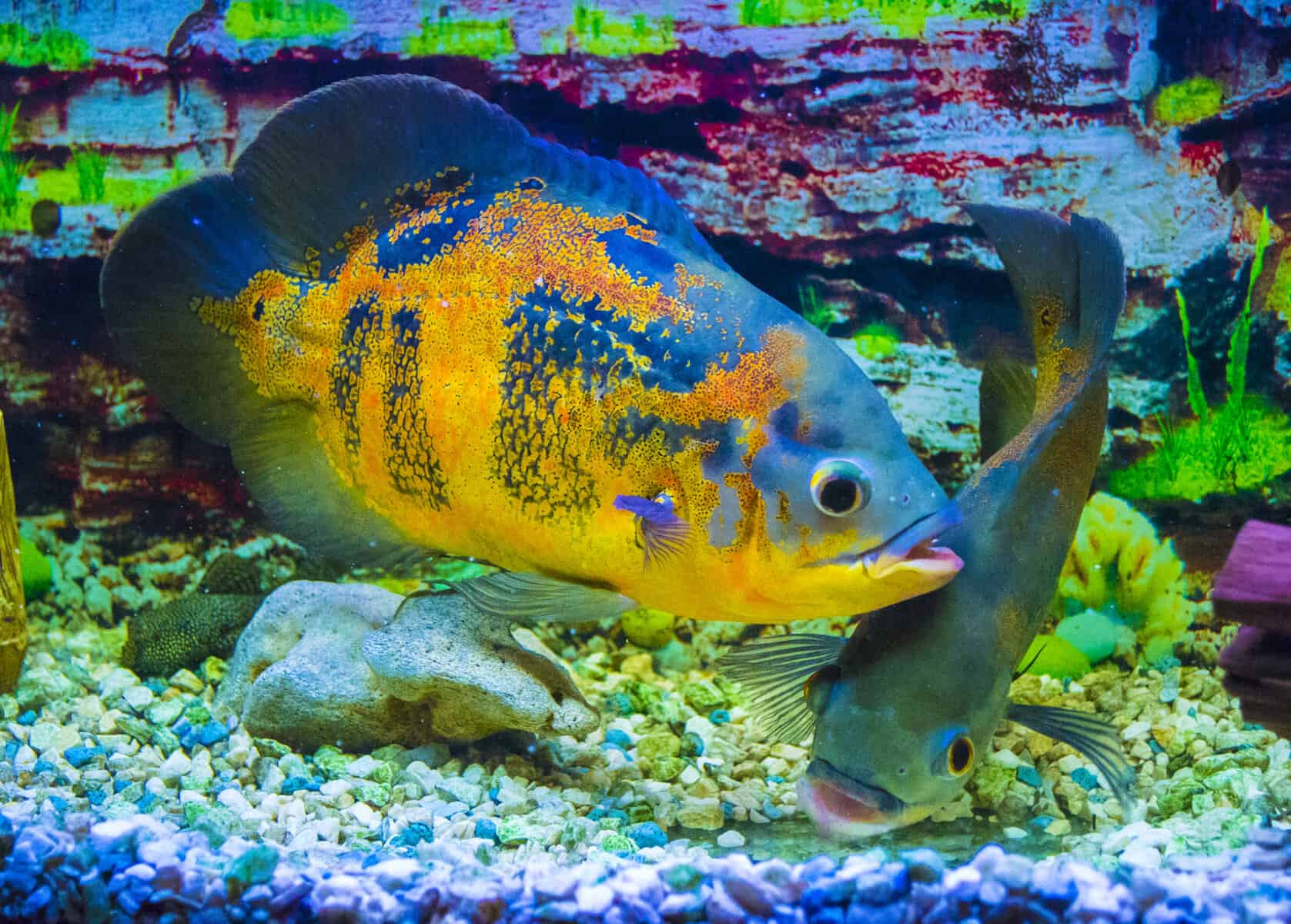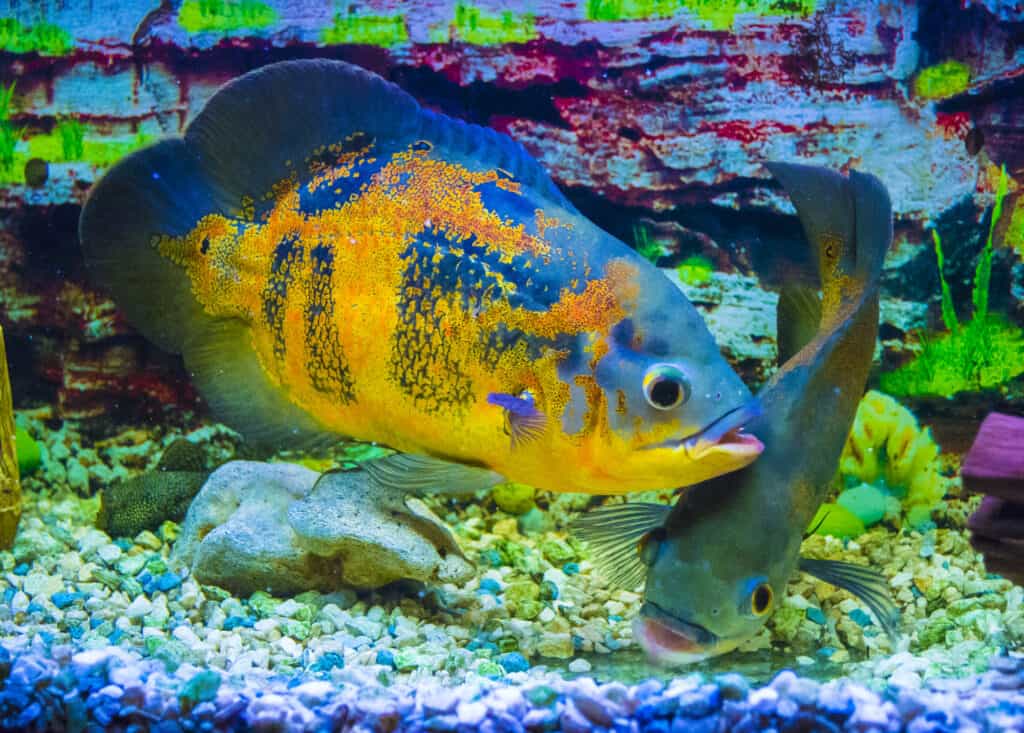If you’ve seen your Oscar’s skin peeling, or scales flaking off, you have good reason to be concerned. Most of the time, skin conditions indicate a serious underlying problem in your Oscar’s tank that need addressing promptly.
Whether your Oscar’s skin is peeling after an ugly encounter with another fish, a skin disease, or incorrect water parameters, I’m going to help you diagnose and treat these unfortunate and potentially dangerous symptoms. Let’s take a closer look.
Causes for Oscar Skins Peeling
There are myriad and wide-ranging causes for Oscar skin to peel or flake off. Let’s take a look at them one by one.
Physical Injuries From Fighting
Oscars are famed for their fierce temperament. These predatory fish are highly territorial and won’t think twice about gobbling up smaller fish for breakfast.
It can be difficult to find good tank mates for Oscars, and when you do, you need a large aquarium to make it work properly.
Some people have had success keeping multiple Oscars, or Oscars with other cichlid species that are similar in size and strength, but it isn’t always easy to find a match made in heaven.
Oftentimes, Oscars will fight with each other, and they can also attack or get attacked by other aggressive fishes such as Jack Dempsey or Firemouth Cichlids.
These battles not only cause considerable stress to your fish, but they can also inflict serious wounds and injuries. If you’re keeping other fish with your Oscar and notice his skin peeling or damaged scales flaking off, it may be due to injuries from fighting.
How to Reduce Oscars Fighting
Try to create hiding places and landmarks in the tank for different fish to stake out their territories. Large rocky caves and pieces of driftwood can help to break up the water and give your fish a place to take cover. Live plants are almost impossible to establish in Oscar tanks, but plastic plants firmly anchored to the substrate can also help.
Keep a close eye on your fish to identify the troublemakers. If the situation doesn’t improve, they may need to be removed. If wounds are serious, move your Oscar to a meticulously clean hospital tank to recover, and seek veterinary advice if wounds become infected.
Ammonia Burns
As with other freshwater fishes, ammonia and nitrites are extremely toxic to Oscars. As well as creating bloody patches on the fish’s body, ammonia spikes in the fish tank can cause:
- Increased respiration and gasping for breath – fish appear to breathe rapidly and may gasp at the water’s surface for air.
- Loss of appetite – severe ammonia poisoning will cause fish to refuse to eat.
- Lethargy – your Oscar may remain motionless or even lie at the bottom of the tank.
- Red or purple gills – a classic sign of ammonia poisoning, gills become inflamed, turning a reddish color, and may also bleed.
Causes of Ammonia Poisoning
Ammonia is produced in a fish tank by rotting fish waste, dead plant leaves, and uneaten fish food. It should always be converted by a mature biological filter into relatively harmless nitrates.
But if the filter has problems, or the tank isn’t cleaned regularly, ammonia and nitrites can build up, poisoning your fish and causing ammonia burns.
You can learn more about ammonia and the nitrogen cycle here.
Test Water for Ammonia and Nitrites
If your fish is suffering any of the above symptoms, your first response should be to test the water for ammonia and nitrites. These compounds are so toxic that they should always be kept at zero. If any ammonia or nitrites are present, you need to act quickly to save your fish from dying.
Treating Ammonia and Nitrite Spikes
Even low levels of ammonia or nitrites in the water can severely harm your fish and should be considered an emergency.
- First, perform an emergency 40% water change with treated water.
- Treat the remaining water with an ammonia-neutralizing agent such as Seachem Prime, and continue to test the water to make sure ammonia is returned to zero.
- Now, try to address the root cause of the problem. Make sure your biological filter is working properly, and perform regular tank vacuuming to ensure relatively sanitary conditions.
- Learn more about addressing ammonia poisoning from our dedicated page here.
Skin Diseases: Ich, Velvet, Cotton Wool disease, and Water Molds
As well as ammonia burns, several infectious diseases can cause your Oscar to suffer from sore, peeling skin.
Ich (White Spot Disease)
Small white spots appear on the fish’s skin, caused by an extremely infectious parasite. Fish with ich become very agitated and may ‘flash’ and scratch themselves against rocks, gravel, or driftwood in an attempt to remove the parasites.
Unfortunately, these scratching attempts can also remove their scales and lead to skin sores.
Velvet Disease
Another parasitic infection that affects the skin, a sick fish suffering from velvet disease will develop a thin layer or coating of white, yellow, or rust-colored film on its body.
Like ich, this makes the fish distressed, causing scratching, flashing, and possible skin damage to ensue.
Cotton Wool Disease (Columnaris Bacteria)
Cotton Wool disease is so-called because it appears as fluffy, cotton-like patches on the fish’s skin. If this bacterial infection is left untreated, it can eat away at the fish’s skin, causing your Oscar to lose scales and suffer skin damage.
Water Molds (Saprolegnia Fungal Infections)
Appearing much like cotton wool disease, water mold infections are sometimes referred to as ‘cotton molds’. In cases of severe infections, it can cause substantial damage to your Oscar’s skin and fins. Proper diagnosis requires a qualified vet.
Preventing Skin Diseases in Oscars
All of the above fish diseases can be prevented by keeping your aquarium clean, and your Oscar in good health.
While these pathogens can easily strike and kill a weak fish living in poor water conditions, a healthy fish living in clean water can often live indefinitely alongside these pathogens without ever becoming infected.
You can find out more about treating these diseases here. For prevention, be sure to check out my top tips further down the page on keeping your Oscar in its very best shape!
Hole-in-the-Head and Lateral Line Disease (HLLE)
Hole-in-the-Head and lateral line disease (aka. ‘HLLE’) is a mysterious aquarium disease, thought to be caused, in part, by the parasite Hexamita. Sadly, Oscars seem particularly prone to this ailment.
While peeling skin is not a classic symptom of HLLE, the pits in the skin that are caused by the disease do cause severe skin damage and can cause pus and mucus to ooze from the skin (apologies for the graphic description!).
Since these trailing bands of mucus could be confused with peeling skin, it seemed a good idea to include HLLE as a possible cause of skin issues.
HLLE needs a thorough understanding to treat, so I’d highly recommend reading our dedicated guide on this serious health condition here if you suspect it in any of your fish.
Incorrect Water pH
Each aquarium fish species has its own pH preferences. The ideal water pH for Oscars is between 6.8-7.2, but they are fairly tolerant and will accept water parameters anywhere between pH 6-8.
If your water’s pH falls outside this bracket, however, your Oscar may develop skin problems. Overly acidic or alkaline water can cause a fish’s skin to become irritated. Just as with skin diseases, the fish may scratch itself on rocks or gravel to relieve the irritation, often damaging its skin further in the process.
Treating Incorrect Water pH
First, you’ll need to test your water to see if the pH is between 6-8.
If it is more acidic than this, you can make it more alkaline by adding alkalizing agents such as limestone, and sustainably-sourced crushed coral.
If your water is too alkaline, you can make it more acidic by adding materials to the aquarium that release tannins. Untreated hardwood driftwood, peat, and especially Indian Almond Leaves are excellent sources of tannins that help to make the water softer and more acidic.
Why Is My Oscar Losing Color?

As well as peeling skin, Oscars will sometimes simply lose their color. This is a classic sign of stress, malnutrition, and ill health. The good news is that you can improve your Oscar’s color and condition back to its former glory by diagnosing and treating any ailments, as well as adhering to good tank maintenance and an improved feeding regime.
Here are some of my top tips on how to do that, and also see my hints on the best possible diet for Oscars at the bottom of the page.
Eight Top Tips for Keeping a Clean Aquarium and Healthy Oscar Fish
Since all of the above scenarios can be prevented with proper care, I’ve compiled a list of the most essential aspects of keeping your Oscar healthy and happy.
- Avoid overfeeding! Overfeeding is one of the greatest causes of poor water quality and fish health issues. Never feed more than your fish can eat within 2 minutes.
- Feed your fish a diverse diet that includes regular additions of live or frozen foods.
- Get yourself a good filter and clean it every 2-3 weeks.
- Vacuum your substrate every 1-2 weeks.
- Make partial water changes of 15-35% every 1-2 weeks, with treated water of matching temperature.
- Get yourself a reliable heater and thermometer. Make daily checks to ensure the temperature is within the ideal range for all of your fish.
- Observe your fish closely every day to ensure they are in good health and interacting peacefully with each other.
- Test your aquarium’s water at least once a month, or any time your fish seem unwell.
Can Oscar Fish Regrow Its Scales?
While prevention is much better than a cure, you may be wondering if your Oscar will ever recover the scales that it lost through injury or ill health.
The answer is that your Oscar’s skin and scales can heal, but there may be permanent scars if the damage was bad enough. You can help your fish make the best recovery possible, however, by providing the very best tank environment and diet that you can.
Oscars are omnivores that veer towards a meaty diet. In the wild, they feed on larvae, insects, fish, crustaceans, and occasional plant material.
You can replicate this high-protein diet at home by feeding Oscars a diverse diet that includes live and frozen foods such as bloodworms, tubifex worms, brine shrimp, mosquito larvae, and mysis shrimp.
The proteins, vitamins, and minerals in these foods will go a long way to helping your Oscar make the fullest recovery possible. Your Oscar will also be tremendously grateful to you for the extra care and all the regular treats!
Conclusion
There are several reasons why an Oscar may lose flakes or its skin may peel, but all of them are serious and require prompt diagnosis and treatment.
Of course, the best way to stop skin conditions in your Oscar is to prevent them by providing the optimum level of care. To find out more about keeping Oscars at their brilliant best, don’t miss our dedicated guide to Oscar care here.


